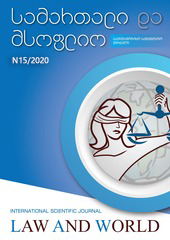Conscientious Objection (European and American approaches) 
##plugins.themes.bootstrap3.article.main##
Abstract
The Article concerns the legal issues, connected with the situation, when a person (or group of people) disobey requirements of the Law or other State regulations on the basis of religious or nonreligious belief. The Author analyses almost all related issues – whether imposing certain obligation on individuals, to which the individual has a conscientious objection based on his/her religious beliefs, always represents interference with his/her religion rights, and if it does, then what is subject of the interference – forum integrum or forum externum; whether neutral regulation, which does not refer to religion issues at all, could ever be regarded as interference into someone’s religious rights; whether opinion or belief, on which the individual’s objection and the corresponding conduct is based, must necesserily represent the clear “manifest” of the same religion or belief in order to gain legal protection; what is regarded as “manifest” of the religion or other belief in general and whether a close and direct link must exist between personal conduct and requirements of the religious or nonreligious belief; what are the criteria of the “legitimacy” of the belief; to what extent the following factors should be taken into consideration : whether the personal conduct of the individual represents the official requirements of corresponding religion or belief, what is the burden which was imposed on the believer’s religious or moral feelings by the State regulation, also, proportionality and degree of sincerity of the individual who thinks that his disobidience to the Law is required by his/her religious of philosofical belief. The effects (direct or non direct) of the nonfulfilment of the law requirement (legal responsibility, lost of the job, certain discomfort, etc..) are relevant factors as well. By the Author, all these circumstances and factors are essencial while estimating, whether it arises, actually, a real necessity and relevant obligation before a state for making some exemptions from the law to the benefi t of the conscientious objectors, in cases, if to predict such an objection was possible at all. So, the issues are discussed in the prism of the negative and positive obligations of a State. Corresponding precedents of the US Supreme Court and European Human Rights Court have been presented and analysed comparatively by the Author in the Article. The Article contains an important resume, in which the main points, principal issues and conclusion remarks are delivered. The Author shows, that due analysis of the legal aspects typical to “Conscientious objection” is very important for deep understanding religious rights, not absolute ones, and facilitates finding a correct answer on the question – how far do their boundaries go?






